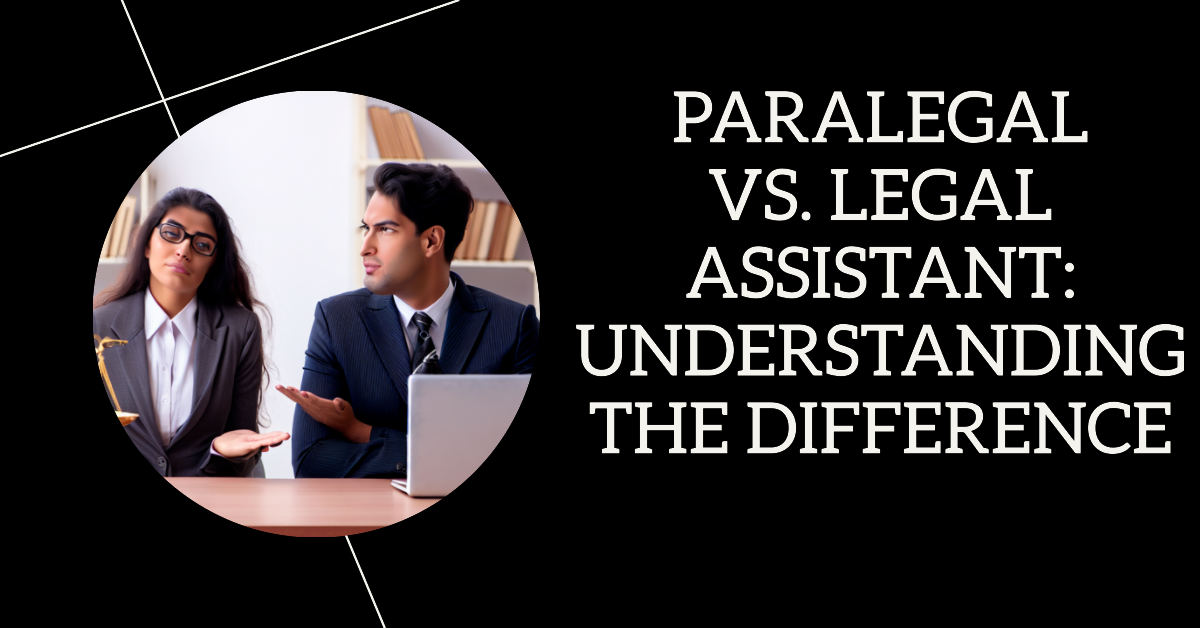Paralegal vs. Legal Assistant: Understanding the Differences and Similarities
Introduction
When delving into the legal realm, two vital roles often come into play: the paralegal and the legal assistant. Despite their shared involvement in legal proceedings, these positions encompass distinct responsibilities, skill sets, and duties. Understanding the disparities and commonalities between these roles is crucial for both aspiring legal professionals and those seeking their assistance within the legal landscape.
Defining the Roles
Paralegal
A paralegal, often referred to as a legal assistant in some jurisdictions, plays a multifaceted role in the legal field. Paralegals are extensively involved in legal research, document drafting, case management, and administrative tasks. Their responsibilities extend to conducting interviews, organizing evidence, and aiding lawyers in preparing for trials.
To further comprehend the scope of a paralegal’s duties, examining government resources can shed light on the specifics. According to the U.S. Bureau of Labor Statistics (www.bls.gov), paralegals assist attorneys by maintaining and organizing files, drafting documents, and conducting legal research to prepare cases.
Legal Assistant
A legal assistant, while sharing some similarities with paralegals, typically focuses more on administrative and clerical tasks within a legal setting. They aid lawyers by managing schedules, arranging meetings, and handling correspondence. Legal assistants may also perform basic legal research and document preparation but often with less involvement in the intricacies of case preparation compared to paralegals.
The U.S. government’s Occupational Outlook Handbook (www.bls.gov/ooh) specifies that legal assistants provide administrative support to lawyers by helping with legal research, preparing legal documents, and maintaining files.
Educational Requirements
Paralegal
Paralegals commonly hold an associate’s or bachelor’s degree in paralegal studies, law, or a related field. Some jurisdictions may require additional certifications or licenses, depending on the scope of responsibilities. Paralegal education emphasizes legal research, writing, and understanding various facets of the law.
Legal Assistant
Legal assistants may not always require formal education specific to the legal field. While some pursue certificates or degrees in legal studies, others gain experience through on-the-job training. The educational prerequisites for legal assistants can vary widely depending on the employer’s preferences.
Key Differences and Similarities
Differences
- Scope of Responsibilities: Paralegals often have a broader scope of responsibilities involving substantive legal work, while legal assistants typically focus on administrative tasks.
- Educational Requirements: Paralegals generally undergo formal education specific to legal studies, while legal assistants may not require specialized education.
Similarities
- Legal Support: Both roles provide essential support to attorneys in various legal matters.
- Document Preparation: Both may engage in document preparation, though the complexity and extent can differ.
Career Advancement and Future Outlook
Paralegal Career Advancement
Paralegals often have opportunities for career advancement based on their experience, specialized skills, and further education. With additional certifications, some paralegals can specialize in areas like litigation, corporate law, or real estate, enhancing their expertise and marketability within the legal field. Advancement may also include taking on supervisory roles or becoming legal consultants.
Legal Assistant Career Outlook
While legal assistants may have fewer opportunities for advancement compared to paralegals, there are avenues for growth within the administrative and support structures of law firms, corporate legal departments, or government agencies. Experience and expertise gained over time can lead to senior-level administrative positions or specialized roles within legal organizations.
Job Market and Demand
Paralegals
The job market for paralegals is expected to remain stable, with a projected growth rate aligned with average job growth across other professions. Factors such as cost efficiency and the increasing complexity of legal work contribute to sustained demand for qualified paralegals.
Legal Assistants
For legal assistants, the job market is also expected to see moderate growth. However, the scope of opportunities may vary based on the industry and geographic location. Law firms, corporate legal departments, and government agencies continue to require skilled administrative support, ensuring a steady demand for competent legal assistants.
Specializations and Responsibilities
Paralegals’ Specializations
Paralegals often specialize in specific legal areas such as family law, intellectual property, or criminal law. This specialization involves a deeper understanding of relevant laws and procedures, enabling them to take on more complex tasks within their chosen field.
Legal Assistants’ Varied Responsibilities
While legal assistants primarily handle administrative tasks, their roles can diversify based on the organization’s needs. They might take on responsibilities related to case management, client interaction, or even basic legal research depending on the employer’s requirements.
The Legal Landscape’s Evolution
Technological Influence
Both paralegals and legal assistants are impacted by advancements in legal technology. Tools for case management, document review, and electronic filing systems are increasingly integrated into their daily workflows, enhancing efficiency and productivity.
Shifting Responsibilities
The evolving legal landscape might result in shifting responsibilities for both roles. Paralegals might see an expansion of their duties as they adopt more technology-driven tasks, while legal assistants may find their roles adapting to accommodate more specialized administrative functions.
Conclusion
In summary, while paralegals and legal assistants contribute significantly to the legal profession, their roles differ in terms of responsibilities, educational requirements, and scope of duties. Understanding these discrepancies is crucial for individuals aspiring to enter the legal field or seeking assistance from these professionals.

